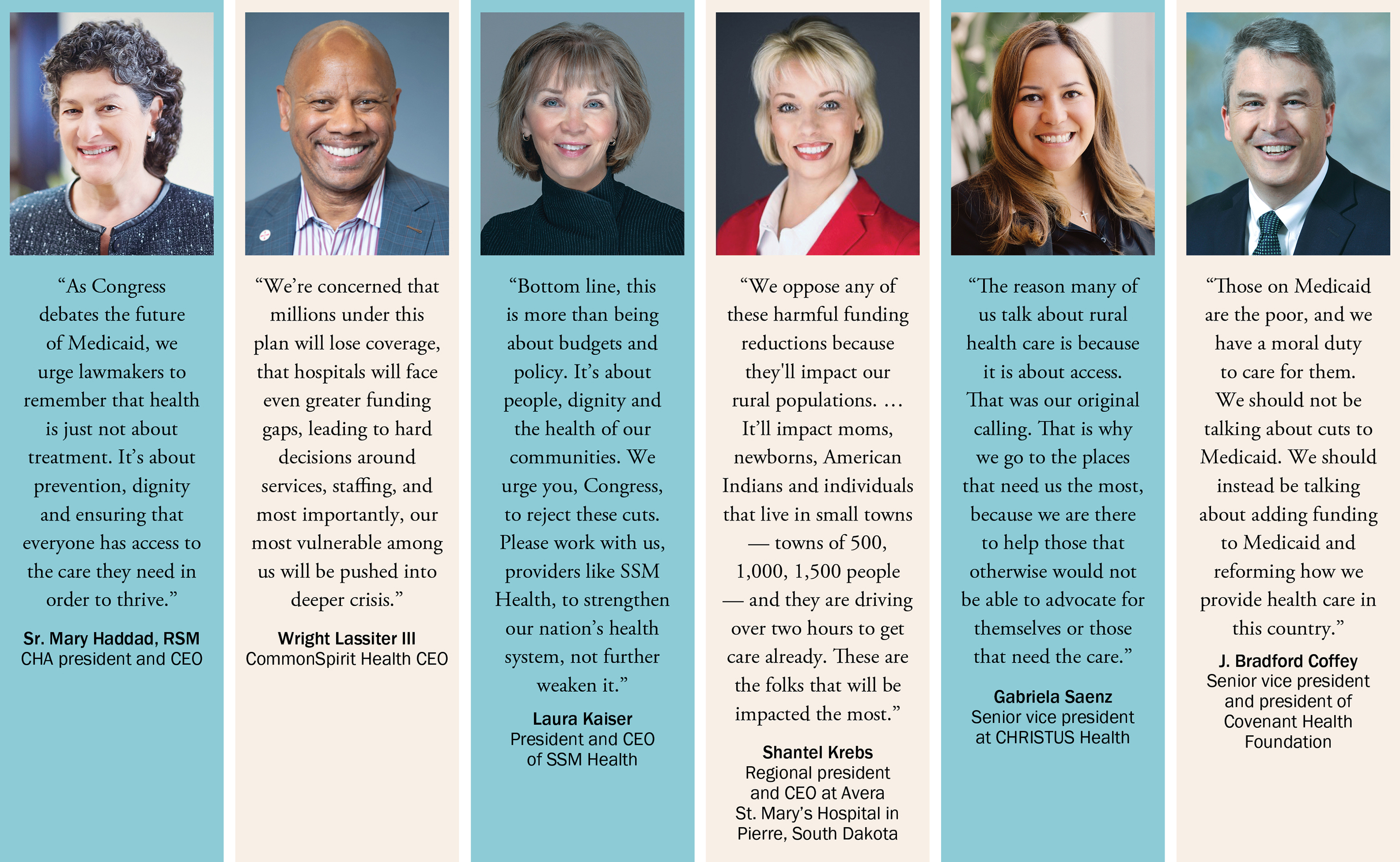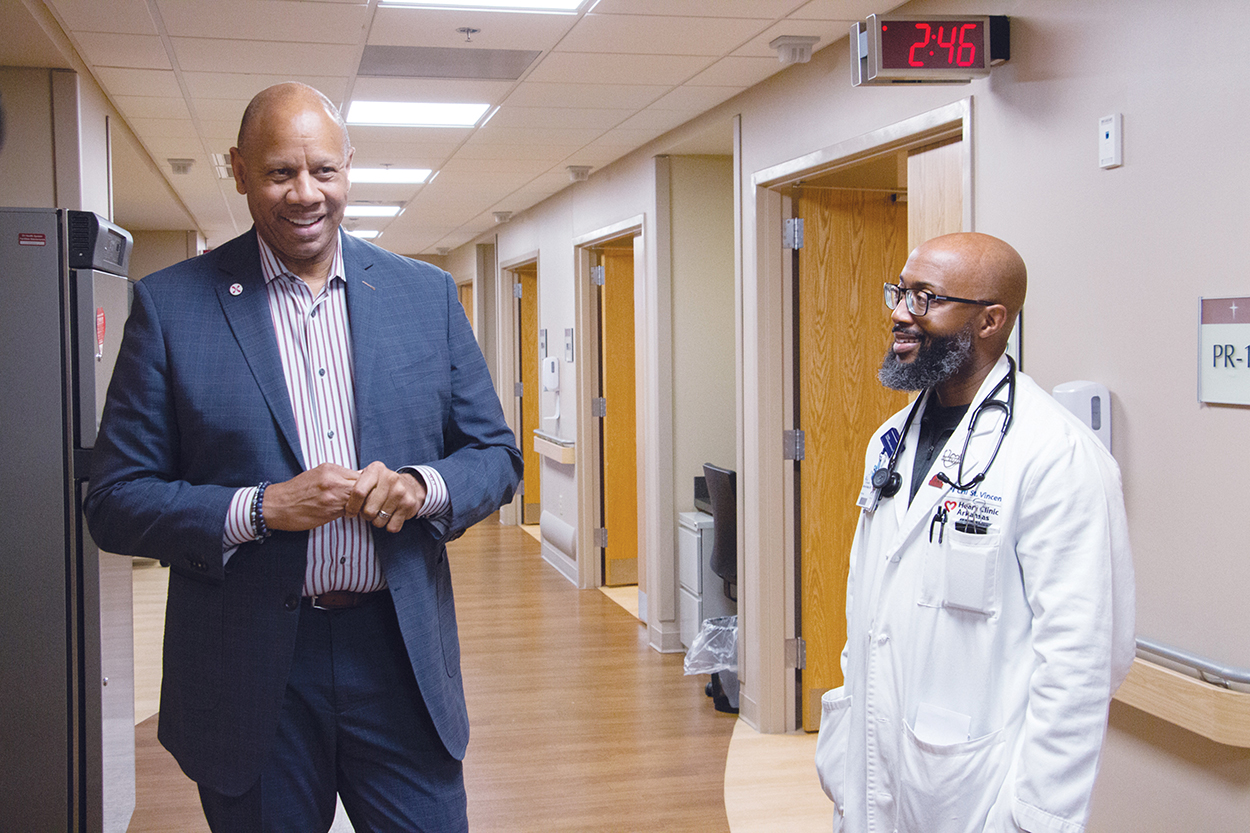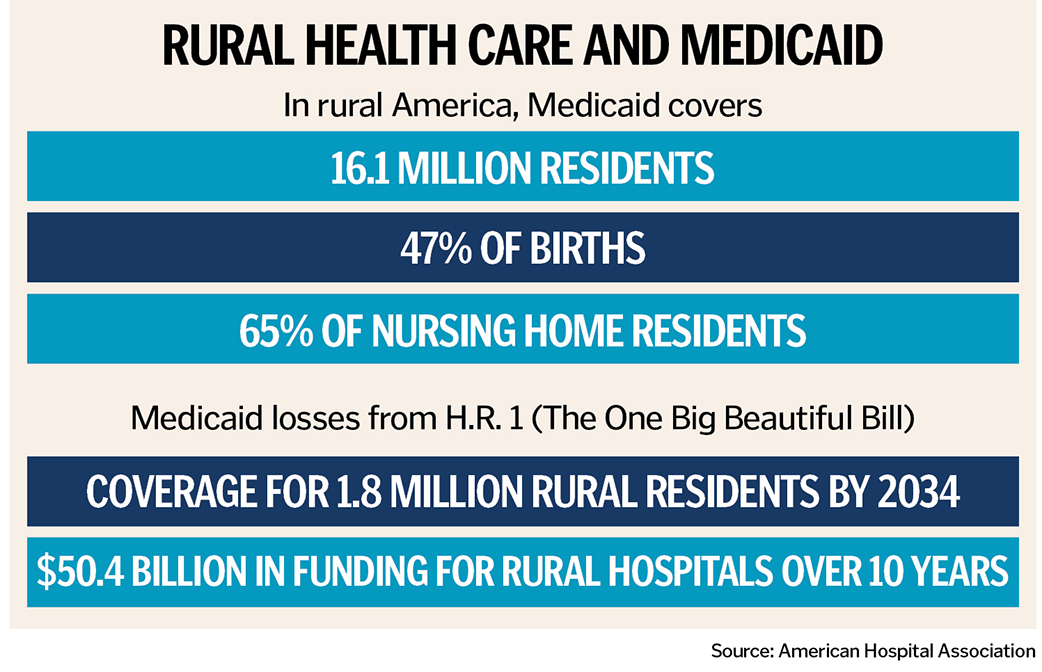
The deep cuts that Congress is proposing to the Medicaid program, if enacted, will have devastating impacts on vulnerable people nationwide, including millions of mothers, children, seniors and immigrants.
But it is not just Medicaid enrollees who are at risk. If the drastic cuts go through, countless health care facilities will have to consider significant reductions in their services, and many will be at risk of closure, causing a ripple effect throughout the health system.
This was the consensus of six Catholic health executives who spoke during a June 17 virtual press briefing convened by CHA. The leaders said it is critical that Congress reject the cuts put forth in H.R.1, the "One Big Beautiful Bill," and instead work with health care providers to bolster the U.S. health system.
Wright Lassiter III, CommonSpirit Health CEO, said if the cuts go through, "at hospitals and providers in our system and outside our system, we will be forced to make difficult decisions that will result in services not being available, not just for Medicaid patients but for all patients. I am hopeful that we will stand together to protect Medicaid because fairness, compassion and shared prosperity aren't just ideals, they are values that define us as a nation."
The other speakers in the briefing were Sr. Mary Haddad, RSM, CHA president and CEO; Laura Kaiser, president and CEO, SSM Health; Gabriela Saenz, senior vice president, corporate services, CHRISTUS Health; Shantel Krebs, regional president and CEO at Avera St. Mary's Hospital, Pierre, South Dakota; and J. Bradford Coffey, senior vice president and president of Covenant Health Foundation.
Threat to lifelines
Congress is debating H.R.1, which President Donald Trump is pushing for passage by July 4. Part of the bill has serious ramifications for the nation's health system. In a June 12 letter to U.S. senators, Sr. Mary said the bill could reduce Medicaid funding by nearly $800 billion, shifting those costs to the states, health care providers and families.
In that letter, Sr. Mary called Medicaid a lifeline that covers one in five Americans. She wrote that H.R.1 would harm critical safety net programs. She called out specific provisions of the bill as particularly concerning. These include mandatory work reporting requirements, increased restrictions on provider taxes and limits on state-directed payment policies, restricted retroactive Medicaid coverage and increased beneficiary co-payments as well as restrictions on states' coverage of care for undocumented immigrants. She also decried in the letter that the proposed legislation would not extend enhanced premium tax credits that help Americans afford coverage through the health insurance marketplaces. Of additional concern, she wrote, are proposed cuts to the Supplemental Nutrition Assistance Program.
Just prior to the June press briefing, the Senate Finance Committee released the draft text of its legislation. Sr. Mary said CHA's preliminary review found that the Senate version of H.R.1 would "impose even more restrictions on provider taxes, state-directed payments, work requirements and care for immigrants," as compared with the House version. She said "these changes to existing law would place additional burdens on many of the Medicaid patients we treat while also limiting states' ability to finance their Medicaid programs."
Not just statistics
During the press briefing, Lassiter described the "perfect storm" of pressures battering the nation's hospitals, including continued financial impacts of the COVID-19 pandemic, damaging commercial insurer denials of coverage, staffing challenges and potential Medicaid cuts. Especially for rural hospitals that are the lifeblood of their communities, Lassiter said the worsening strains on hospitals could cause service cuts and even closures. He said many of CommonSpirit's 157 hospitals are rural facilities that run on very tight margins; 29 are critical access hospitals.

"We're concerned that millions under this plan will lose coverage, that hospitals will face even greater funding gaps, leading to hard decisions around services, staffing and most importantly, our most vulnerable among us will be pushed deeper into crisis," said Lassiter.
Kaiser said Medicaid is essential to Catholic health care facilities' ability to carry out their mission of serving the poor and vulnerable. She said more than 10 million Americans could become uninsured under the proposed cuts. Echoing Lassiter's message, she said that the fallout will have an impact beyond the enrollees themselves, with hospitals' stability threatened and closures likely.
She noted that some of the bill's provisions that may seem reasonable at first glance, such as work requirements and co-payments for beneficiaries, actually put up unnecessary barriers to care.
She said the concerns are not just about budgets and policies, they have to do with real people. Kaiser described Annie, a patient who came to an SSM Health facility in 2020 with significant behavioral health concerns, jobless and unstable. Thanks in part to Medicaid coverage and counseling and therapy, Annie stabilized and now has a house, a car and a job. "That's what access to high-quality compassionate health care looks like and makes possible," Kaiser said.
Sounding the alarm
Krebs said Avera's facilities serve a vast swath of rural America in five states in the upper Midwest, including multiple large populations of Native Americans.

She noted that rural hospitals already have been under significant pressure and that has meant reductions of critical services and closures of some facilities. She said that some rural patients must drive hours for care. This is an especially dangerous situation for rural women who need obstetric care, she said, noting that maternal mortality rates are high for Native Americans.
She said these rural women, infants and Native Americans are the people who will be most hurt by the impacts of the cuts.
Saenz said most of CHRISTUS' southwest U.S. service area is rural, and about 60% of the people that system serves are insured under government-sponsored care.
She said "we are sounding the alarm" on how the proposed cuts would damage the underlying infrastructure of the health care system without addressing any of the drivers of health care cost inflation. She added that innovative programs that providers like CHRISTUS have developed to serve people insured under Medicaid are at risk if funding is slashed. She cited as an example a CHRISTUS program that has nurse practitioners paying visits to rural patients.
Saenz recalled how the founding congregations of Catholic health care had a calling to care for those most in need and those who could not advocate for themselves, and she said today's ministries are following through on that call as they oppose the cuts.
'Blessed are the poor'
Coffey, whose northeast U.S. system primarily serves Maine and New Hampshire, echoed the concerns of the other executives, saying that strains are making it difficult for Covenant Health to cover costs, maintain staffing and invest in facilities.
He said patients already are feeling the effects. He frequently hears of community members worried about how they'll be able to access the care they need.
The proposed cuts would make the situation even more dire, he said. Thousands of people in Covenant's patient base could lose coverage. Every one of those people is important, he said.
He pointed to Matthew 5:3, which says, "Blessed are the poor in spirit, for theirs is the kingdom of heaven." Coffey said people who are insured under Medicaid are the poor, "and we have a moral duty to care for them."
Coffey added, "We should not be talking about cuts to Medicaid. We should instead be talking about adding funding to Medicaid and reforming how we provide health care in this country."
Sr. Mary said, "We urge the Senate to protect and strengthen the programs that uphold the dignity, health and well-being of all, especially those most in need."
